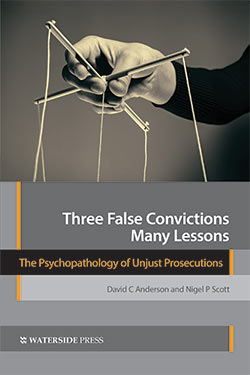
Over three years ago I was contacted by Professor David Anderson, a retired endocrinologist who lives in Umbria. His Italian home is a short drive from Perugia. He had an idea for a book. Was I interested in getting involved?
We had first met in 2012 in Seattle at a gathering of supporters of Amanda Knox and Raffaele Sollecito, who were framed for the murder of English student Meredith Kercher in Perugia, Italy in 2007. They were eventually released in 2011 after four years in prison.
David and I joined the campaign in 2010, immediately after a guilty verdict was handed down in December 2009, at the end of their first trial. It was that wrong-headed verdict that had sucked us into the campaign and subsequently piqued our interest into the wider subject of wrongful convictions and how they arise.
I travelled with my wife to Umbria in 2013, where we re-established contact with David and his wife and also met veteran Italian crime journalist Mario Spezi, who has had also suffered at the hands of controversial prosecutor Giuliano Mignini, the man who charged Amanda and Raffaele. You can read more in the book he wrote with Douglas Preston, “Monster of Florence”.
This was when the concept of what was to become “Three False Convictions”, was framed. Originally, David’s idea was to involve Mario in the book project as well, but for various reasons, that did not happen.
David’s proposition was simple. Miscarriages of justice have several causes. Most of them are preventable. Justice systems have evolved in a haphazard way, often without due regard for science or psychology. Investigators, prosecutors, judges and juries are frequently fallible and sometimes malicious. Journalists and editors can conspire to create and compound injustice because a juicy story attracts more attention and makes more money. The public often demonstrates confirmation bias and schadenfreude. As if all this is not enough for an innocent defendant to contend with, the internet has added trolls and bloggers to the mix. Suddenly everyone believes him or herself to be an expert, regardless of whether or not they know what they are talking about, or have any understanding of the facts.
Three years later, after much writing and editing – and further twists and turns in the saga of Amanda and Raffaele’s wrongful conviction, the book is ready. It could not have appeared without the friendship and advice of many people – and the forbearance of our wives.
It analyses injustice through the prism of three murder cases, one Italian, one British and one American. One thing all the cases have in common is that they began with incompetent investigations which inevitably led to the arrest of the wrong people. The flaws in procedure are picked apart and the book concludes with suggestions for improving the delivery of justice and reducing the possibility of error.
Waterside Press is a specialist publisher in the field of the law and justice, so our book could not have a better home. Our editor Bryan Gibson has ably steered the project to a satisfactory conclusion. He has our gratitude.
You can order a copy here: